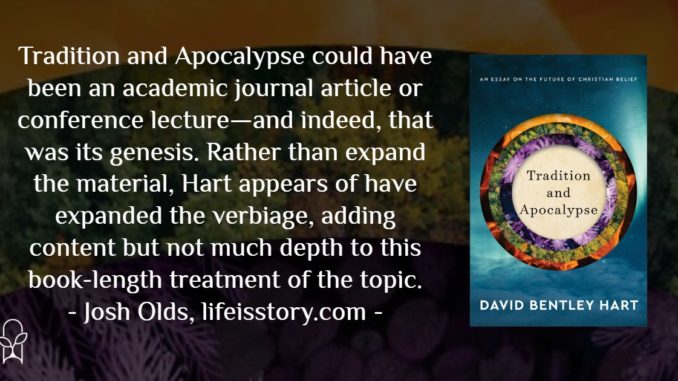
Published by Baker Academic on February 8, 2022
Genres: Academic, Non-Fiction
Buy on Amazon
Goodreads

In the two thousand years that have elapsed since the time of Christ, Christians have been as much divided by their faith as united, as much at odds as in communion. And the contents of Christian confession have developed with astonishing energy. How can believers claim a faith that has been passed down through the ages while recognizing the real historical contingencies that have shaped both their doctrines and their divisions?
In this carefully argued essay, David Bentley Hart critiques the concept of "tradition" that has become dominant in Christian thought as fundamentally incoherent. He puts forth a convincing new explanation of Christian tradition, one that is obedient to the nature of Christianity not only as a "revealed" creed embodied in historical events but as the "apocalyptic" revelation of a history that is largely identical with the eternal truth it supposedly discloses. Hart shows that Christian tradition is sustained not simply by its preservation of the past, but more essentially by its anticipation of the future. He offers a compelling portrayal of a living tradition held together by apocalyptic expectation--the promised transformation of all things in God.
I’ve been told for some time that I needed to read David Bentley Hart. Not knowing quite where to start (though his That All Shall Be Saved is on my shelf), I ended up beginning with his latest—Tradition and Apocalypse. At the heart of his message is simply this: Christian tradition has always been wider than most Christians have considered it, which should lead us into an understanding and acceptance of a Christianity (or Christianities) that is wider and more inclusive today. However, Hart also muses that there will always be this divide between those who so Christianity as an enduring institution and those who see Christianity as denominationalized and divided into a collection of beliefs that move about due to cultural and historical influences.
Integral to Hart’s arguments are assessments and critiques of John Henry Newman’s Essay on the Development of Doctrine and Maurice Blondel’s Histoire et Dogme. Hart attacks these classics on Christian tradition with vigor, and also with the assumption that the reader already has the context needed to understand Newman and Blondel’s situations. Tradition and Apocalypse would have been stronger if Hart either gave readers a fuller background to both Newman and Blondel or wrote his arguments without resorting to the problematization of past scholars. While I doubt Hart would agree, the reference to Newman and Blondel directly does not appear necessary for his argument. Hart concludes that both of these books are valuable, but unsuccessful because they are essentially tautological, beginning with the assumption that doctrine developed as it did and was legitimate simply because it happened. This is a valid point, but what I’ve explained in a sentence takes part multitudinous and unnecessary pages.
My primary criticism of the book is going to be David Bentley Hart’s style of writing. This is something he is consistent with to the point that he’s known for it, but it still bears a friendly, gentle critique. To goal of communication is to be understood. It’s about the reception of what one is communicating. Hart’s writing style is probably best described as a florid string of fustian magniloquence that wavers between poetical philosophizing and frustrating Daedalian obfuscation. And if you needed a dictionary to understand that sentence, you’ll want one by your side while reading Tradition and Apocalypse.
After a fifteen page highly academic musing on the concept of “traditionalism,” wherein modern people appeal to the simplicity of an ancient tradition, but that tradition only seems simple because it has been simplified and mythologized. When he finally pauses for a breather, you get this sentence: “Admittedly, this entire topic might seem rather recherché from the vantage of the ordinary believer.” After looking up recherché (obscure), I’m inclined to agree.
This style does have the benefit of causing the reader to slow down and consider Hart’s arguments closely. There’s no speed-reading through this book. Academic language is expected in an academic book, but Hart’s overuse alienates him from much of his intended reading audience. It also allows him to pad the book’s length as he uses many words to describe what would have been just as sufficiently described in a few sentences. In all, Tradition and Apocalypse could have been an academic journal article or conference lecture—and indeed, that was its genesis. Rather than expand the material, Hart appears of have expanded the verbiage, adding content but not much depth to this book-length treatment of the topic.
Overall, then, for those wanting to explore David Bentley Hart’s thoughts on the future of Christian belief vis a vis a reflection on the wideness of Christian tradition, I would first consider his conference lecture or his chapter “Tradition and Authority: A Vaguely Gnostic Meditation” in The Idea of Tradition in the Late Modern World: An Ecumenical and Interreligious Conversation.
P.S. – Tradition and Apocalypse has one of the most beautiful book covers I’ve ever seen.
